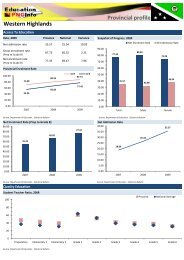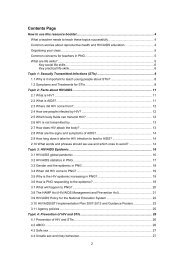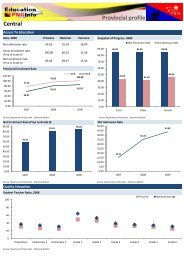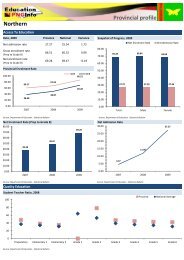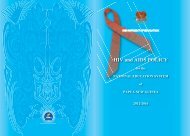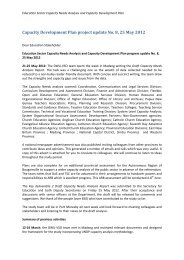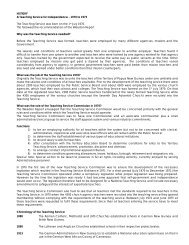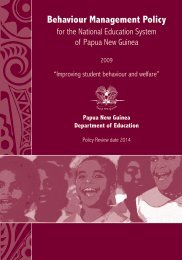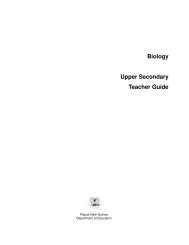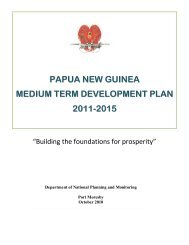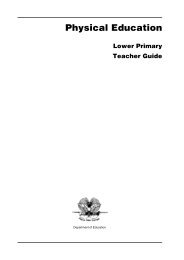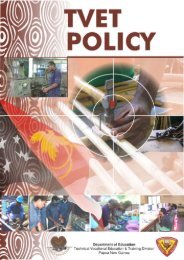Health Education to Prevent HIV/AIDS & STIs - Department of ...
Health Education to Prevent HIV/AIDS & STIs - Department of ...
Health Education to Prevent HIV/AIDS & STIs - Department of ...
You also want an ePaper? Increase the reach of your titles
YUMPU automatically turns print PDFs into web optimized ePapers that Google loves.
<strong>Department</strong> <strong>of</strong> <strong>Education</strong> TVET Division<br />
<strong>HIV</strong>/<strong>AIDS</strong> & STI Teacher Guide<br />
Lesson 15<br />
By the end <strong>of</strong> this lesson students can…<br />
2.3 Explain which life skills help reduce the risk <strong>of</strong> <strong>HIV</strong><br />
Resources: Scrap paper, sticky tape, bridge model on the board (without life skills<br />
bridge)<br />
a. Introduction: (15 mins) Things We Share.<br />
The class stands or sits in a circle. One person stands in the middle. The people in<br />
the circle stand on a leaf or thong or piece <strong>of</strong> paper or they sit on a chair. The person<br />
in the middle calls out something about themselves and people have <strong>to</strong> change<br />
places if that is shared by them. Last person <strong>to</strong> stand on a spot must go in the middle<br />
and call out something about themselves.<br />
e.g. “I have no children”, “I like dogs” “I know how <strong>to</strong> use a condom” “I am a Blues<br />
supporter” “I was born in January” “I am wearing a shirt” etc<br />
Say, “Life skills are important because people with good life skills are more likely <strong>to</strong><br />
take care <strong>of</strong> themselves and others. One life skill is empathy which is thinking about<br />
others – we have just practiced seeing how we are similar and different.”<br />
b. Main Activity: (20 mins) Life Skills<br />
Say, “These are some key life skills,”<br />
• Young people who feel themselves <strong>of</strong> high value( self esteem) are less likely<br />
<strong>to</strong> put their health and life at risk by having unsafe sex)<br />
• People with self-confidence are able <strong>to</strong> make their own decisions they can<br />
withstand peer pressure.<br />
• People who feel insecure with low self-esteem will tend <strong>to</strong> do what they are<br />
<strong>to</strong>ld by others.<br />
• People with good communication skills can negotiate safe sex or ‘ say no’ <strong>to</strong> (<br />
abstinence)<br />
• People with good communication skills and strong values do not need <strong>to</strong><br />
show <strong>of</strong>f displaying risky behaviour such as drinking alcohol and chasing<br />
women<br />
• Women with high self-esteem and strong values do not need <strong>to</strong> be sexy or <strong>to</strong><br />
adapt a risky life-style <strong>to</strong> feel that they are worth something.<br />
There are many teaching and learning strategies for helping young people develop<br />
life skills, both practical and social. Life skills lead <strong>to</strong> personal development and a<br />
healthier lifestyle.<br />
59





